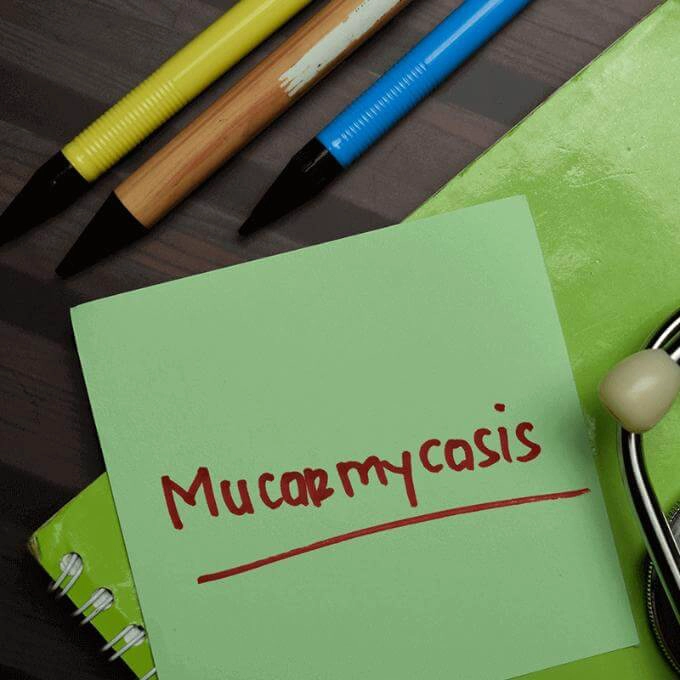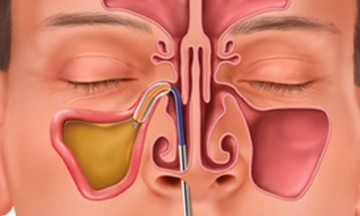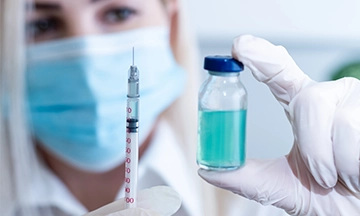
Mucormycosis, commonly known as black fungus, is a rare but serious fungal infection caused by a type of fungus called micromycetes, which is abundant in the environment. It mostly affects people who have health problems or take medicines that decrease the body's ability to fight germs and disease. This usually affects the nose, sinus, paranasal sinus, and sometimes even spread to the eye and the brain. It is called black fungus because it leads to the blockage of all the blood vessels small and large that supply blood in and around the vision of the face. When there is a blockage of these blood vessels due to infection, it causes the blood flow to decrease which causes a process called necrosis and that makes the whole area turn black.
What are the symptoms?
Although the blackening of the face & area over the nose, etc can be seen in Mucormycosis, there are a lot of early signs which one should be careful about when dealing with patients with decreased immunity. Patients with mucormycosis can start up complaining of headaches, they can complain of hemifacial pain, and over a period of time they can develop swelling over the face, over the eyelids and sometimes the eyeball can actually start getting pushed outwards and the patients can start developing blurry vision and decreased the visibility. They also have sometimes spread to the brain which will cause much more severe neurological complications. But patients with diabetes should always look for blood-stained mucus coming from the nose or facial pain especially if it is only on one side, which could be a very early sign of Mucormycosis.
The common symptoms of Mucormycosis include:
- Pain and redness near eyes or nose
- Fever
- Headache
- Cough
- Shortness of breath
- Bloody vomiting
- Altered mental state
Warning signs may include loosening of teeth, toothache, blurred vision, or double vision with pain.
Who are the most vulnerable?
Mucormycosis used to be an uncommon condition. We are finding more and more people with decreased immunity are more susceptible to this kind of problem. Patients who frequently get mucormycosis usually have diabetes, severe kidney disease or are on dialysis, or they have compromised immunity due to any other medications which are going on. People with all these problems are also more prone to developing COVID.
Sometimes questions arise that taking medicines for any other comorbidities can cause problems like this? Well, the short answer is that the medicines do not directly cause problems of mucormycosis, but they do cause a certain amount of immunosuppression. These medicines are required to decrease inflammation, but can also decrease immunity. So if patients are already unstable either due to decreased control of blood sugar or any other problems, then they are more prone to developing Mucormycosis. Now that doesn’t mean that you stop these medications because unfortunately patients are dying of COVID and these can be lifesaving drugs. So there is a very specific balance that we need to look for to prevent any side effects but at the same time prevent the effects of COVID.
How is it diagnosed?
The diagnosis of mucormycosis is primarily based on clinical evaluation by an ENT surgeon. A diagnostic endoscopy is usually conducted with visualization of the specific blackish lesion to confirm the presence of fungus. Some of these crusts are removed and sent for testing to confirm the presence of fungus. Imaging with MRI (or contrast CT if MRI is not possible) is necessary to understand the extent of the disease, and it should be done as soon as possible.
Is Mucormycosis treatable?
Mucormycosis is primarily treated with medications but not just any medication. There are specific antifungal drugs that are used for invasive fungal diseases such as Mucormycosis. There are various injections and tablet formulations that are used for longer periods. Unfortunately, these are very strong chemicals and have some side effects. So, not only you need to start medications but also need to monitor them well, and make sure that you don’t get any secondary infections or any fall in immunity. The duration of medicines can be decreased by performing certain surgeries which will reduce or remove the fungal load.
What kind of surgery is required?
It usually involves surgical debridement by the ENT specialist. In the case of eye involvement, orbital decompression( to decrease the pressure on the eyeball), or even removal of the eye and the structures surrounding it may be required. It is a surgery done to reduce the amount of fungal load on the patient’s body and may be needed to save a patient's life. Additional local injections of drugs directly around & into the eye may be able to control the disease and relieve the eye of disease.













